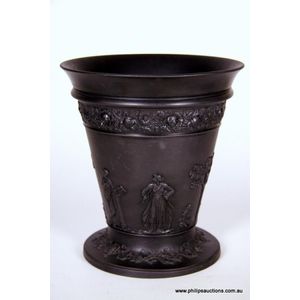Wedgwood Basalt Ware Jardiniere with Classical Scene
You must be a subscriber, and be logged in to view price and dealer details.
Subscribe Now to view actual auction price for this item
When you subscribe, you have the option of setting the currency in which to display prices to $Au, $US, $NZ or Stg.
- Basalt - Basalt is a hard, dense volcanic rock formed from the rapid cooling of basaltic lava, and makes up most of the earth's oceanic crust.
However it is also the name given by Josiah Wedgwood in 1768 to a fine black unglazed porcelain which he called Wedgwood Black Basalt.
Using this fine-grained stoneware he was able to produce copies of the newly excavated Etruscan pottery from Italy, with a lustrous and smooth, surface, and this new innovation proved to be a huge commercial success. - Dating English Ceramics - Excellent detailed reference books such as Godden's Encyclopaedia of British Pottery and Porcelain Marks will help to identify and date specific manufacturer's marks.
However, there are a few simple guidelines which may also help.
The inclusion of the word 'England' on an item ensured compliance with the American McKinley Tariff Act 1891, which was important for British exporters. An item so marked would have been made after 1891.
In 1921 the act was revised to require the phrase 'Made in' followed by the country. So if an item is marked 'Made in England', it is generally considered to be made after that date, although some manufacturers were using this phrase pior to the act being changed.
The use of the word 'Ltd' of 'Limited' after a company's name indicates a date after 1860, though with ceramic manufacturers this did not become general practice until the 1880's.
This item has been included into following indexes:
- Wedgwood (England), item types
Visually similar items

A Wedgwood basalt Ware jardiniere, circa 1909-1929, of conical shape with a spreading foot, with a slip decorated classical scene of figures representative of the liberal arts in a landscape setting, between a floral and fruiting band to the upper body and

A Wedgwood black basalt cachepot, c.1890

An antique English provincial oak bucket with iron bindings and handle

A Wedgwood black basalt planter vase, early to mid 19th century, a conical planter or vase with proud rings, a rose and pomegranate border near the rim, and a continuous neoclassical scene in low relief with figures engaged in narratives, the spreading bas
